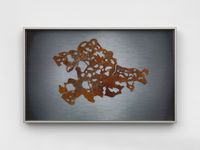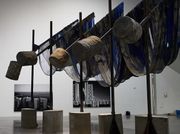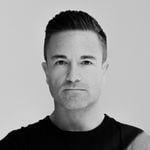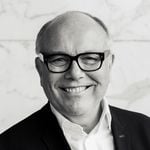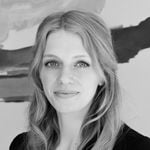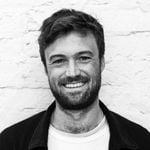Working across performance, sculpture, drawing, painting, textiles, photography and installation, Otobong Nkanga is a multidisciplinary artist whose practice considers the relationship between humankind and land and its resources. Born in Kano, Nigeria in 1974, Nkanga studied at Obafemi Awolowo University in Nigeria before continuing her studies at the École nationale supérieure des Beaux-Arts in Paris. In 2008 Nkanga completed her master's in the Performing Arts at DasArts, Amsterdam. The artist is based in Antwerp.
Read MoreIn 2015, Nkanga embarked on a field trip in Namibia where she traced the railway route from Swakopmund to Tsumeb. Almost entirely defunct, the line's construction was completed in 1906 by the Otavi Mining and Railway Company (OMEG). Its path leads to what was once a minerally rich area in Tsumeb, commonly called the 'Green Hill'. Extensive mining has, however, transformed the hill into a cavernous hole—a monument that speaks to human desire and the exploitation of natural resources. The sound recordings, video, photographs, performance documentation, interviews and images from the Namibian archives that Nkanga collected during her journey along the railway route acted as a catalyst for an array of projects and artworks, including a series of intensive workshops held at Frankfurt's Städelschule, where she was guest professor in 2015. Out of her research came In Pursuit of Bling at the 8th Berlin Biennale, followed by exhibitions at Kadist Art Foundation in Paris (Comot Your Eyes Make I Borrow You Mine, 27 September–20 December 2015), Portikus in Frankfurt (Crumbling Through Powdery Air, 16 July–6 September 2015), and M HKA in Antwerp (Bruises and Lustre, 14 October 2015–17 January 2016).
In Pursuit of Bling (2014) is centred on the natural mineral mica, whose name is Latin for 'crumb' but is thought to have derived from the Latin micare, which means 'to glitter'. Nkanga's artwork explores mica's different applications once it has been processed, reflecting on the human desire to turn resources into commodities. In Pursuit of Bling was later included in Nkanga's first survey exhibition in the United States in 2018 at the Museum of Contemporary Art Chicago (To Dig a Hole That Collapses Again, 31 March–2 September 2018). In an Ocula Conversation with Stephanie Bailey held in June 2018, Nkanga explains that the work 'was not only about looking at that material sense of light, but also thinking about it in relation to spirituality and connection to a place, and how we can understand the notion of migration and displacement by thinking about a hole that displaces because of the removal of what it once contained. As the hole is made, the body is displaced.'
The processes of corrosion, oxidation and transformation of natural materials were explored by Nkanga in her commission for the 2017 Belgian Art Prize, which comprised four works including In a Place Yet Unknown (2017)—a tapestry displaying a poem by Nkanga that slowly absorbed a liquid from a container placed at the bottom, using the rising stain as a way in which to think about the transformation processes that occur in society.
Nkanga's research-driven approach to contemporary art in some cases necessitates specialists or practitioners. Such is the case in Carved to Flow (2017–2018), an ongoing project that was conceived for documenta 14. The work is composed of three 'phases': 'the Laboratory', 'the Warehouse & Distribution', and 'the Germination'. The first phase comprised of a site-specific installation in Athens that functioned as a soap-making factory, which saw Nkanga work alongside soap maker Evi Lachana to create soap, inviting participants to contribute to the process and add to the installation. Through the use of natural ingredients such as olive and coconut oil, Nkanga unveiled the potential for soap as a medium 'capable of expressing complex geographical, historical and affective entanglements.' For the project's third phase, the artist has created The Carved to Flow Foundation, based in Akwa Ibom in Nigeria, which seeks to sustain the initiatives from the project and will be dedicated to 'fostering shared experimentation and exchange locally.'
Tessa Moldan | Ocula | 2018
